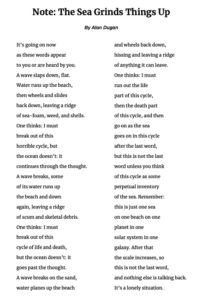Poetry is an invitation to slow down and think more deeply about experiences, observations, perplexities, beauties, enragements, and delights. Good poetry helps us see more honestly and accurately. Sometimes poems are joyous riots of sound, and sometimes they are plainspoken truths. They connect us to the world and to each other, giving voice to our most tender privacies while remaining part of our public discourse.
Most places I walk on the Outer Cape are enlivened by poems. I see a sanderling at the winter shore-edge and think of Elizabeth Bishop (“The roaring alongside he takes for granted”). When I hear a cicada in summer, Stanley Kunitz’s words burble up (“Desire, desire, desire”). A great blue heron taking off from the marsh invokes Sam Hamill (“He pushes the world away”).

Picture the scene: the poet is standing at Head of the Meadow Beach on a raw January day. Breakers crash, seaweed and old lobster traps are washed up. The poet feels a desperate, churning dejection (“One thinks: I must/ break out of this”) then realizes “the ocean doesn’t.” And, suddenly, what seems dark and bleak becomes, somehow, hopeful.
Even though the final line of Dugan’s poem reads “It’s a lonely situation,” I don’t find this poem sad or lonely. On the contrary. The whole relentless thing has been a tribute to the sea’s ongoingness and the poet’s pragmatism, and both are transformed into wonder.
The sea keeps going, day after day; we keep watching (since it’s there for the watching), yet we are never bored. We might even think the same thing each time we approach the shore, but that, too, becomes a comfort, as does the fact of our smallness alongside the sea’s wild indifference. Dugan tells us to “Remember:/ this is just one sea/ on one beach on one/ planet.” Look, he says, there are seas ignoring your human feelings all the time and everywhere! Your loneliness is not unique … and that’s not a problem. It’s a balm.
Dugan is, to put it mildly, an anti-Romantic. No broad wash and swale for him, no tribute to the glories of dramatic horizons or ship-wrecking storms. The speaker is not awed, not thrilled, not frightened. He is, simply, observant of the cycle before him: “Water runs up the beach,/ then wheels and slides/ back down.”
And the title! Not an ode or an elegy, just a “note” to the self, to us. A jotted thing to remember later. And what’s it to remind us of? Keep it real. Take it down. Something gets created even out of mindless repetition. The ocean is “hissing and leaving a ridge/ of anything it can leave.” Just by going through the motions, it is making something. Maybe you, human, will, too!
Spending time with this old favorite, I realized that, in the poem, the sea’s work and the poet’s work become one. “It’s going on now/ as these words appear/ to you or are heard by you,” a theme the poem returns to in the end: “this is not the last word,/ and nothing else is talking back.” There’s more to write. Keep trying.
I have a thing for the cranky poets. The contrarians. The old coots, male and female, hiding their tenderness with dry wit, ironic detachment, flatness, persnickety detail, or deliberate fatalism: Philip Larkin, Kay Ryan, Marianne Moore. They know that, although the world can be disappointing, it’s still worth looking at.
Alan Dugan’s first book, titled simply (and hilariously) Poems, was selected for the Yale Series of Younger Poets in 1961. Then followed Poems 2, Poems 3, and on until Poems Seven: New and Complete Poetry, which won the National Book Award in 2002.
I think Dorothy Antczak introduced me to this poem when we worked at the Fine Arts Work Center in the late 1990s. I was new to the Cape, shy of the poetic luminaries around me. I didn’t know “Dugan,” as everyone seemed to call him. His wife, the artist Judith Shahn, would sometimes come into the Work Center office, and when I heard her voice in the lobby, I’d poke my head around the corner. Her black leather pants and her raspy smoker’s voice terrified and thrilled me. Dorothy told me who Judy was, who Dugan was. She gave me a copy of this poem. It felt like an introduction to some secret story of the magic of this town. I fell in love. I would never look at “the sea” the same way again.
Judy and Dugan, who married in 1956, started a greeting card business together on the Cape. I have never seen any of their cards, but I love imagining one with, on the front, a Judy Shahn print of dories scattered on the beach and, inside, the words, “It’s a lonely situation.” It would make me laugh.
Elizabeth Bradfield’s most recent books are Toward Antarctica and Theorem, a collaboration with artist Antonia Contro. In 2022, Provincetown Arts Press will publish Broadsided Press: Fifteen Years of Poetic/Artistic Collaboration, which she co-edited. She lives year-round in Truro.
